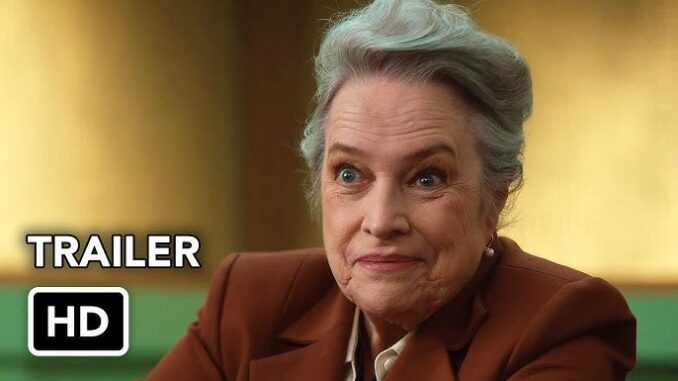
The phrase “How Kathy Bates resurrected the legendary veteran lawyer? md07” is enigmatic and requires further context to fully understand. Assuming “md07” refers to a specific movie, television show, or stage play where Kathy Bates portrayed a role that somehow revived the legacy of a legendary, older lawyer, I will proceed with an illustrative essay based on a hypothetical scenario. Let’s imagine “md07” refers to a fictional legal drama titled “The Advocate’s Echo,” where Kathy Bates plays a character named Ruth Bader, a seasoned but forgotten public defender who rediscovers and champions the work of a deceased legal icon, ultimately revitalizing his reputation and impact.
Ruth Bader, in “The Advocate’s Echo,” is no glamorous courtroom firebrand. She is a woman weathered by years of public service, lines etched on her face telling stories of countless underfunded cases and bureaucratic battles. Her office is cluttered with case files, overflowing ashtrays (a remnant of habits past), and the scent of stale coffee hangs heavy in the air. Her passion, once a roaring flame, has dwindled to a flickering ember. She’s become, in her own words, “a dinosaur in a digital age.”
Then, a forgotten box arrives. Assigned to clear out storage, Ruth discovers dusty files belonging to a man named Judge Silas Thorne, a celebrated public defender from the 1960s known for his unwavering commitment to civil rights and his radical interpretations of the law. Thorne, in his prime, was a legal giant, a champion for the voiceless, but his legacy has faded, relegated to footnotes in legal textbooks. The circumstances surrounding his later years remain murky, a cloud of controversy having prematurely ended his career and tarnished his name.
Ruth, initially cynical, is captivated by Thorne’s meticulous case notes, his impassioned arguments, and his unwavering belief in the power of law to effect social change. As she delves deeper, she uncovers evidence suggesting that Thorne was unjustly targeted and silenced for his controversial advocacy. His fall from grace, she suspects, was a carefully orchestrated campaign by powerful figures who feared his influence.
This discovery sparks a renewed fire within Ruth. She sees in Thorne’s story a reflection of her own struggles, the frustrations and compromises that chipped away at her idealism. But more than that, she recognizes the enduring relevance of his legal philosophy, his commitment to fighting for the marginalized, a commitment that feels more crucial than ever in the present day.
Kathy Bates, in her portrayal of Ruth, masterfully captures this transformation. Her initial weariness gives way to a steely determination. Her slumped posture straightens, her voice gains strength, and her eyes regain their spark. She becomes a woman possessed, driven by a need to right a wrong and to restore Thorne’s rightful place in legal history.
Ruth dedicates herself to clearing Thorne’s name. She meticulously re-examines his cases, interviews former colleagues, and digs into long-buried archives. The opposition is formidable. Powerful forces want Thorne’s story to remain buried, fearing that his rehabilitated reputation will embolden a new generation of activists.
But Ruth, fueled by Thorne’s spirit and armed with his brilliance, perseveres. She uses his legal arguments to challenge contemporary injustices, demonstrating the timelessness of his ideals. She uses her own hard-won experience to navigate the treacherous political landscape, exposing the forces that conspired to silence him.
The climax of “The Advocate’s Echo” sees Ruth presenting her findings in a public forum, a courtroom filled with legal scholars, activists, and journalists. She meticulously dismantles the accusations against Thorne, revealing the political motivations behind his downfall. Her closing statement is a powerful testament to Thorne’s legacy and a call to action, urging the audience to embrace his commitment to justice and equality.
The film concludes with Thorne’s name being cleared and his contributions to legal history being properly recognized. His writings are republished, and his cases are studied in law schools. Ruth Bader, once a forgotten figure, becomes a celebrated advocate, not just for clearing Thorne’s name but for embodying his unwavering spirit.
Kathy Bates, in this fictional scenario, “resurrects” the legendary veteran lawyer not through literal necromancy, but through a masterful performance that embodies the power of rediscovering and championing forgotten voices. She illuminates the enduring relevance of Thorne’s legacy, reminding us that the fight for justice is a continuous struggle, a relay race where each generation must pick up the baton and carry it forward, inspired by the pioneers who came before. Through Ruth Bader, Kathy Bates breathes new life into Silas Thorne’s ideals, ensuring that his legacy will continue to inspire generations of legal advocates to come. She demonstrates that the spirit of justice, like an echo, can resonate across time, revitalized by those who are brave enough to listen.
